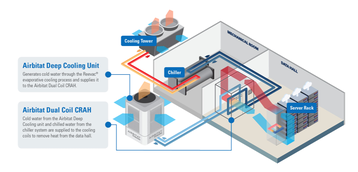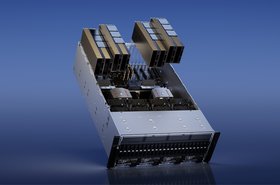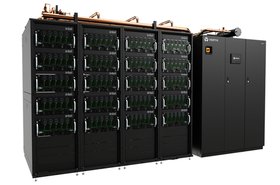ST Engineering has launched a data center pre-cooling system which it says will save tropical data centers 20 percent of their cooling cost compared to conventional chillers working on their own.
The Airbitat DC Cooling System sits between the server room and the existing chiller system, reduces the heat load on the chillers by 40 percent, by pre-cooling the hot return air from the data hall, using chilled water produced by ST Engineering's Reevac evaporative cooling system.
ST Engineering says the system will enable a PUE (power usage effectiveness) of 1.3 or less, which will be a requirement for all new data centers in Singapore, according to recent policy announcements.
Singapore-based ST Engineering already sells its Airbitat systems for cooling large open spaces, and even outdoor environments, including Singapore Zoo. The Reevac Deep Cooling system uses evaporation to create a reservoir of cold water, that is fed to a heat exchanger. The cooled air then passes through a second stage of evaporation, producing a "deeply cooled" air stream.
The company claims this evaporative cooling system is "always 50 percent more effective in delivering deeper cooling than any other conventional air cooler, in every environment", and is now pitching it as an add-on for data centers.
Cold water from a Reevac evaporative cooler is passed through a dual coil heat exchanger to pre-cool waste hot air from the data hall. The net effect is to cut total cooling energy requirements by 20 percent, the company says.
TheAirbitat DC Cooling System does not use compressors or refrigerants, so it doesn't pollute or generate waste heat. Obviously an evaporative system will use water, but ST Engineering says it has lower water consumption requirements than conventional water-cooled chiller systems. ST Engineering says the system will save about $104 per kW of heat load.
Airbitat is designed for conditions ranging from hot and humid, to hot and dry. It has controls that respond to ambient psychrometric conditions, and adjust cooling in real-time for energy efficiency. It has a modular construction that can fit easily into many different data center layouts, in brownfield and greenfield sites.
The promise of a PUE of 1.3 or less is significant, as Singapore's regulations will require this for all new data centers.
In 2019, Singapore imposed a moratorium on new data centers, after the revelation that the sector used some seven percent of electricity, in 2020. Electricity use is a serious environmental concern in the tiny island state, which has a very low percentage of renewable power.
The moratorium was lifted at the beginning of 2022, but with conditions. Only a limited amount of new capacity will be allowed, and new space must meet performance guarantees.
“Through re-engineering our established Airbitat solution for the data center environment, we have successfully developed a sustainable solution that significantly cuts energy consumption while reducing carbon intensity and Urban Heat Island Effect,” said Gareth Tang, Head of Urban Environment Solutions at ST Engineering. "Its ability to be readily deployed in existing data centers presents an attractive option for operators who are looking for cost-effective solutions to lower energy consumption and achieve their sustainability targets."







